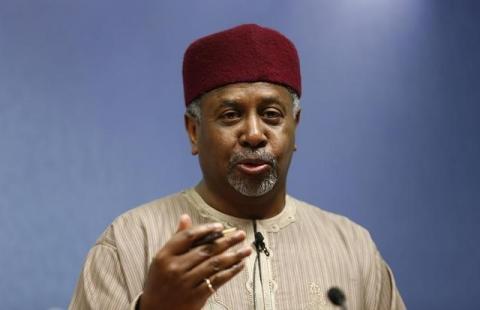Advertisement
Nigeria fraud case puts Buhari's anti-graft drive in the dock
ABUJA (Reuters) - True to his election promises, Nigerian President Muhammadu Buhari has gone all out on corruption, alleging mind-boggling sums plundered from state coffers and giving investigators licence to pull in big hitters once thought untouchable.
Now comes the hard part: making the charges stick.
The first test comes on Wednesday with the opening of the trial of former National Security Advisor Sambo Dasuki, accused of fraud over $68 million of defence spending, part of a wider $2.1 billion in arms deals under scrutiny.
Dasuki will be joined in court by ex-minister of state for finance Bashir Yuguda, an ex-director of finances at the NSA and a former head of the state oil firm, who also face corruption charges. Former defence minister Bello Haliru Mohammed has separately been accused of fraud and colluding with Dasuki. They have all pleaded not guilty.
Most of the funds alleged to have been misused were earmarked for the fight against Islamist militant group Boko Haram, which has killed thousands in northeast Nigeria in the last seven years.
The allegations have dominated television bulletins and newspapers for weeks, an indication of how badly Nigerians want to see justice for those who they believe have been stealing with impunity for years.
Although an immediate adjournment is likely, longer-term a successful trial and conviction is crucial for Buhari, a 73-year-old former military ruler who won the election last year largely on the back of vows to get tough on graft.
"Dasuki's trial is very significant because it addresses the challenge of impunity that we have seen in government," said Clement Nwankwo, director of the Policy and Legal Advocacy Centre, a think-tank in Abuja.
The People's Democratic Party, ousted by Buhari after dominating politics since military rule ended in 1999, has accused its successor of conducting a witch-hunt.
Nwankwo said the most important lesson, irrespective of the verdict, was for allegations to be scrutinised in open court, unlike the military tribunals that characterised Buhari's first stint in power, as a military ruler, in the early 1980s.
The prosecution of any of the high profile figures charged since Buhari took office in May would be the biggest corruption conviction since the return to civilian rule in 1999.
To date, the biggest case is that of Tafa Balogun, a former police chief successfully prosecuted for money laundering in 2005 and sentenced to six months in prison.
On Monday, information minister Lai Mohammed said 55 people including government ministers, state governors and bankers stole $6.8 billion of public money between 2006 and 2013.
GREEN LIGHT
He did not provide evidence but the assertions are another sign of the green light shown to the Economic and Financial Crimes Commission (EFCC), an institution that has seldom had the clout to pursue top public officials or businessmen.
"The real difference is the current administration has placed enormous emphasis on the fight against corruption and that has influenced the EFCC enormously," commission spokesman Wilson Uwujaren said.
Its probe of Dasuki began after it received a presidential committee report alleging the former NSA's misuse of funds.
Last week, the same committee cast the net wider, accusing 38 former top military chiefs, officers and companies with detailed counts of fraud dating back to 2007.
They are alleged to have siphoned off hundreds of millions of dollars via contracts for antiquated equipment such as 40-year-old ammunition, helicopters without rotor blades and jets that were paid for but never arrived at the Air Force.
One outcome of corruption investigations could be to recover missing funds, a goal made all the more urgent because of the collapse in global oil prices which has eroded Nigeria's government revenue.
Buhari says some funds have been returned but has given few details. So far the EFCC has said only one cash return has been confirmed in relation to allegations against Dasuki - that of 100 million naira ($500,000) paid by Lawal Jafaru Isa, a prominent member in Buhari's ruling party.
The president said the government of his predecessor, Goodluck Jonathan, left the nation's coffers "virtually empty".
Think tank director Nwankwo said there was also a danger that the fight against graft would overshadow other efforts needed to address the worst economic crisis in years.
"Very little is going on in terms of any other initiatives on the economy," Nwankwo said. "This fight against corruption seems to be aimed at substituting a proper economic policy."
(Additional reporting by Oludare Mayowa and Alexis Akwagyiram; Editing by Ed Cropley and Peter Graff)



















Add new comment